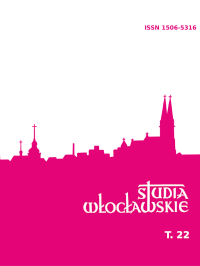Truth – doctrine – pastoral care
DOI:
https://doi.org/10.52404/ttnwloc.stwl.22.9Keywords:
truth, dogma, priesthoodAbstract
Nowadays, we are dealing with the dispute not only about what the truth is, but also if the truth, in absolute terms, even exists. Hence, we are said to live on the times of post-truth. Such doubts have also penetrated the Church. They are fed, inter alia, by the memories of those philosophic-religious traditions that wanted to close the truth in the only one framework of concepts.
Meanwhile, we must defend the existence of truth and also admit the truth is symphonic, what means that there are different dimensions of truth and different ways we have of coming to the truth. In the theology the truth is expressed, alter alia, in dogma. On one side, the Church emphasises that dogma, if we understand them in a proper context, offer us changeless truth. On the other side, it points that dogma are fruit of some kind of faith development and the enunciation of dogma term is the culmination of its development, but at the same time it is the opening of the wide field of interpretation and further discussions. A person who is the best in confronting these strains is cardinal J.H. Newman. He shows Roman Catholic Church is not identical as the first centuries Church; however, it does not mean the interrupting the continuity of faith. It is rather about the fulfillment of the Jesus’s promise: ‘But when he, the Spirit of truth, comes, he will guide you into all the truth’ (John 16:13). The doctrine, clearly given to believe, is not an obstacle for developing a living priesthood, as somebody seems to think. Obviously, the examples of rigid, doctrinal and closed for the signs of time predictions can be provided. Although, it does not mean that the doctrine should be left on the sidelines of priesthood. Pope Francis on one side, is afraid of dogmatism, but, on the other one, emphasises that you cannot oppose the doctrine and priesthood. In the Church history there is no lack of people who were prominent theologians because they were great priests and vice versa.
Downloads
References
Sobór Watykański II, Dekret Optatam totius, 1965.
Sobór Watykański II, Konstytucja dogmatyczna Lumen gentium, 1964.
Sobór Watykański II, Konstytucja duszpasterska Gaudium et spes, 1965.
Jan Paweł II, Encyklika Fides et ratio, 1998.
Jan Paweł II, List apostolski Novo millennio ineunte, 2001.
Benedykt XVI, Przemówienie podczas uroczystości wręczenia Nagrody im. Ratzingera, 30 VI 2011, https://opoka.org.pl/biblioteka/W/WP/benedykt_xvi/przemowienia/nagroda_30062011.html [1.12.2019].
Wywiad z papieżem Franciszkiem dla „La Civiltà Cattolica”, 19 VIII 2013, https://www.zyciezakonne.pl/dokumenty/kosciol/franciszek/franciszek-artykuly-i-wywiady/wywiad-z-papiezem-franciszkiem-dla-la-civilta-cattolica-34281/ [1.12.2019].
Franciszek, pap., Adhortacja apostolska Evangelii gaudium, 2013.
Franciszek, pap., Videomessaggio del Santo Padre Francesco al Congresso internazionale di Teologia presso la Pontificia Università Cattolica Argentina, Buenos Aires, 1–3 settembre 2015, https://w2.vatican.va/content/francesco/it/messages/pont-messages/2015/documents/papa-francesco_20150903_videomessaggio-teologia-buenos-aires.html [1.12.2019].
Franciszek, pap., Adhortacja apostolska Gaudete et exsultate, 2018.
Kongregacja Nauki Wiary, Deklaracja Mysterium Ecclesiae, 24 VI 1973.
Kongregacja Nauki Wiary, Instrukcja o niektórych aspektach „teologii wyzwolenia”, 6 VIII 1984.
Kongregacja Nauki Wiary, List Placuit Deo do Biskupów Kościoła katolickiego o niektórych aspektach zbawienia chrześcijańskiego, 22 II 2018.
Od wiary do teologii: Dokumenty Międzynarodowej Komisji Teologicznej 1969–1996, red. J. Królikowski, Kraków 2000.
Balthasar H.U., Prawda jest symfoniczna, Poznań 1998.
Benedykt XVI, Jezus z Nazaretu, cz. 1: Od Chrztu w Jordanie do Przemienienia, Kraków 2001.
Benedykt XVI, Światłość świata, Kraków 2011.
Enchiridion symbolorum, definitionum et declarationum de rebus fidei et morum, red. H. Denzinger – P. Hünermann, Bologna 1995.
Frossard A., Portret Jana Pawła II, Kraków 1990.
Kowalczyk D., „Cóż to jest prawda – Ja jestem prawdą”. Teologiczne meandry i nadzieje dialogu kultur i religii, w: Dialog wielokulturowości i prawda, red. H. Czakowska, M. Kuciński, Bydgoszcz 2018, s. 132–142.
Kowalczyk D., „Niedogmatyczna” prawda dogmatów, http://teologia.deon.pl/niedogmatyczna-prawda-dogmatow/ [1.12.2019].
Kowalczyk D., Prawda w Kościele, w: D. Kowalczyk, Między dogmatem a herezją, Warszawa 2003, s. 36–49.
Kowalska F., Dzienniczek, Kraków 2016.
Lane T., Wiara, rozum, świadectwo. Dzieje myśli chrześcijańskiej, Bielsko-Biała 2001.
Rosato Ph., Perché studiare teologia a Roma?, w: Problemi e prospettive di teologia dogmatica, red. K.H. Neufeld, Brescia 1983, 495–520.
Wincenty z Lerynu, Pamiętnik (Commonitorium), Kraków 2012.
Włoski protestant: Książka papieża to „apologia chrześcijaństwa”, https://info.wiara.pl/doc/165658.Wloski-protestant-Ksiazka-papieza-to-apologia-chrzescijanstwa [1.12.2019].





